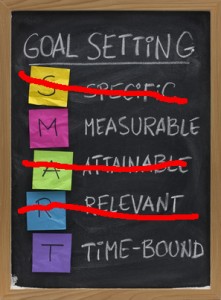Should goals be based around outcomes, or based around processes?
Hmm. There are three common views on this.
One is that all goals must be outcome based. It doesn’t matter how much you try if you don’t actually achieve the desired outcome.
Another view is that people are too obsessed with outcomes and need to focus more on the process. This is captured in a lot of eastern-based philosophies that tell us to this exact moment is all we have so enjoy the present. Too much obsession about future results blocks our ability to grow and uncover hidden opportunities.
But most advisers on goal setting, myself included, advocate a balance. There are some times when you want to base your goals around outcomes and other times around processes.
But are there any guidelines about when to use one approach vs. the other? I think there are.
What Are Process-Goals?
Process based goals are best when you are taking on a new goal in an area where you aren’t already skilled or experienced.
Think of process-based goals as habits or activities. Ultimately, you expect those habits to lead to outcomes but initially your goal should be simply to develop the habit itself! Once you have the habit down, that’s when you’ll turn your focus to the outcomes those habits are intended to produce.
Let’s take a common one: getting into shape. When you are just starting out, you simply need to get into the habit of eating better and exercising more.
An example goal could be, “For the next three months, I am going to get to the gym three times a week for at least 45 minutes each time, and I’m going to do these types of exercises: x, y, z. Additionally, I will eliminate all beer and twinkies from my diet.”
It’s still measureable and timebound. But notice there is no specified outcome – no amount of fat lost or muscle gained, even thought that’s really your long-term goal – to lose fat and/or gain muscle.
Or let’s say you are trying to learn how to do computer programming. If you know nothing about how to do it, you can’t possibly set up a realistic outcome goal. Initially, you need to set up some process-based goals. For example, spending a certain amount of time a week working on examples in a guidebook. You can’t even set up an outcome goal about when to finish the book because you have no idea how long it will take! You’re too new to the subject matter. And as you know, all good goals have a time-based component.
What Are Outcome-Goals?
Now eventually, once you’re more experienced in something, then you switch to outcome driven goals. Outcome based goals almost disregard the process to get there – all that matters is the outcome!
So, if you’re really already skilled at computer programming, you don’t really need to have a process-driven thing of “I’m going to code for 4 hrs everyday for the next week”. You can jump to outcome based goals like “I will write a program in C++ that models the swine flu outbreak over the next 12 months allowing for up to 5 different input variables, and will complete this code bug-free and user tested by May 12th.”
And going back to the fitness example, if you have already been working out and eating well, and have some baseline of how much fat you have lost or muscle you have gained, is it enough to stick to a goal based solely around showing up at the gym?
No! You’re already experienced. You don’t need to learn the process, you don’t need to develop the habit. You need an outcome. And in that case, outcome-driven goals are the most appropriate. For example “By May 15 I will weigh 170 lbs and be at 15% bodyfat”.
A Short Quiz
So which of these short goal statements are process-based and which are outcome-based?
- I am promoted to Sr. Account Manager by June 30
- Every day, I’ll brush my teeth after lunch
- Whenever I eat out with friends, I will not eat the bread that comes to the table and I will only order water to drink
- By May 31, I will fit into a size 10 pair of Levis
- At my weekly book club meeting, when Joan starts getting obnoxious, I will count to 10 before responding.
Answers: outcome, process, process, outcome, process
Now, look at your own goals (you have them written down, right???). Put a little O or P next to each one after you determine whether each is a process-based goal or an outcome-based goal.
Corollary: I often talk about Major Goals and Minor Goals (and even mini-Goals). For results-based Major Goals, it is still critical to have many minor or mini-goals to support it. The bigger the goal, the more important those minor goals become. They give you feedback along the way to make sure you are really on your path to achieving the major goal. And regardless of the type of Major Goal (process- or outcome-based), your minor goals can be a mix of process and outcome types.
p.s. You might see me and others refer to outcome-based goals as “results-based goals” by mistake. They are certainly synonyms, but outcome has the connotation of being a byproduct of specific, intentional effort towards a conclusion, whereas result connotes a certain about of passivity. Linguistic expertise aside, I will do my best to use “outcome” – correct me if I slip!
